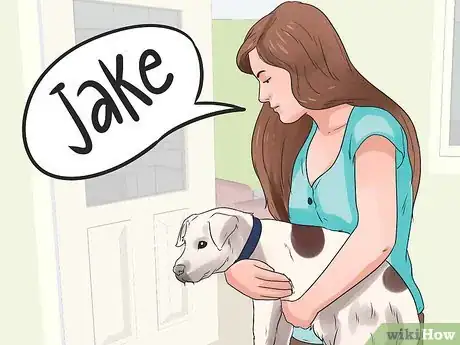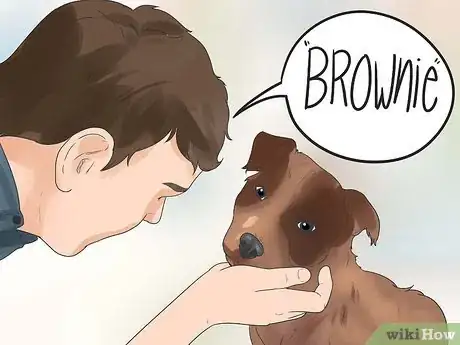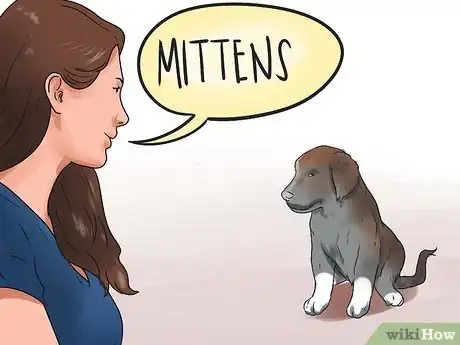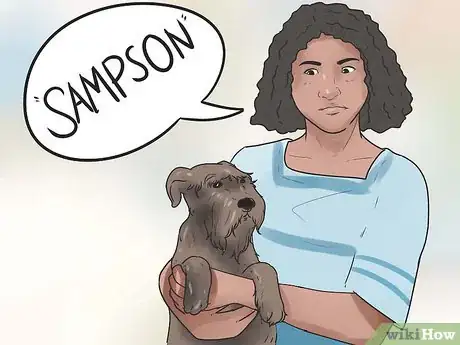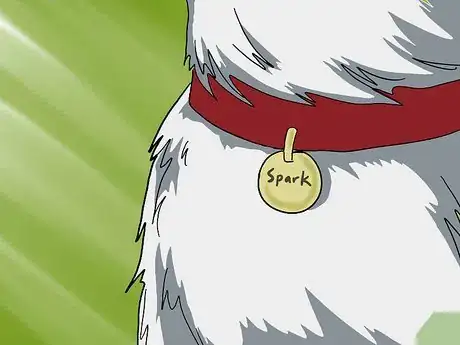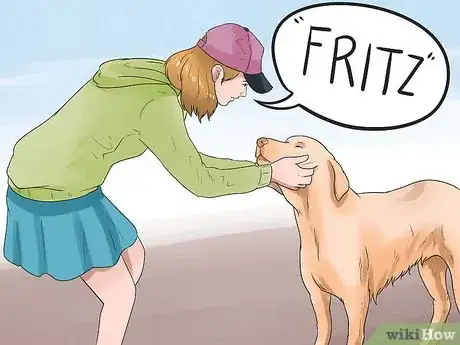This article was co-authored by Jessica Char. Jessica Char is a Cat and Dog Trainer, Behavior Consultant, and the Founder of Feline Engineering and Canine Engineering. She specializes in modifying challenging pet behavior problems, such as fear and aggression, using positive reinforcement training protocols. Jessica is a Certified Fear Free Trainer, a Certified Professional Dog Trainer, and a Certified Separation Anxiety Trainer. She is also a member of the International Association of Animal Behavior Consultants. Jessica received her BS and MS in Biomedical Engineering from Washington University in St. Louis.
wikiHow marks an article as reader-approved once it receives enough positive feedback. This article received 11 testimonials and 83% of readers who voted found it helpful, earning it our reader-approved status.
This article has been viewed 323,037 times.
As the saying goes, a dog is a man's best friend (or something along those lines). And a best friend deserves a truly fantastic name. However, coming up with your furry companion's name may actually be harder than you think. Luckily, wikiHow is here to help you sort through the endless possibilities. Scroll down to Step 1 to learn some helpful steps about how to pick your pup's name.
Steps
Using Quick Tricks to Name a Pup
-
1Stick with shorter names. Dogs have an easier time recognizing names that are either one or two syllables long, compared to names that are more complex. Instead of naming your dog something like Sir Merlin of Mangovia, you should shorten the name to Jake, or Meg.[1]
- If you do want to give your pup a longer, more formal name, know that you will ultimately end up shortening it no matter what (it will just be easier to call for him to come that way) so go with a name that shortens into something cute.
-
2Try out names sharp consonants. Dogs hear high frequency sounds very well, so names starting with s, sh, ch, k, etc. work well when catching a dog's attention. Dogs will respond more quickly to these relatively sharp sounds. At the same time, consider names that end with a vowel, particularly a short ‘a’ or a long ‘e’ sound.[2]
- Some example names that follow these rules include Simba, Kassie, Sweetie, Delilah or Charlie.
Advertisement -
3Do not pick a name that sounds similar to a command. Because dogs do not particularly recognize the actual word, but instead understand the frequency of the word, they can get confused by words that sound too similar--particularly when one of those words is a command that they are supposed to follow.
- For example, the name "Kit" can easily be confused with the command "sit". The name “Bo” could be confused with “no”.
-
4Stick with similar sounds if you are renaming an older dog. Be careful when changing an older dog's name. Stick with similar sounds, such as changing "Barney" to "Farley." It's more important to keep the vowel sounds the same than the consonants, since vowels are easier for the dog to pick up on and are what the dog is actually listening for. So "Pinky" will accept "Mikey" but not "Porky."[3]
-
5Remember that you’ll be using your dog’s name in public. Some names have a family meaning, but it may not go over well at the vet or dog park. Choose a name that you're happy to call out in public.[4] Also, choosing a name that's too common will mean your dog might run to someone else (or you might get another person's dog jumping on you).[5]
- Names like “Fido” or “Rover” should probably be avoided, as they are some of the more traditional, and therefore more popular, dog names.
- You should also consider the sort of reaction that the name you give your dog might inspire. For instance, people will probably be a little more leery of a dog named “Murder” than a dog named “Honey”.
-
6Ask before using a family member or friend's name. You may think it’s an honor to name your pup after your favorite Aunt Matilda, but she may not take it as a compliment. She might think of it as disrespect.
-
7Try the name out for a couple of days before you make it permanent. Once you’ve chosen a new name, try it out for a day or so. See if it grows on you. You’ll know really soon whether it’s a keeper or not. If not, try something else. There are always many more puppy names to explore and try out. Don't forget to reward your puppy or dog when they respond to their new name. The more treats, love and hugs they receive now, the sooner they'll come running when you call later.
- Pay attention to how it feels to say your pup’s potential name. Could you see yourself using that name over and over again? If your answer is no, you may want to consider choosing a different name.
-
8Explore many names. If you are really struggling on what you should name your dog, and need a little help being creative, you can always run an internet search for a list of cool dog names. There are quite a few websites that specialize in this topic and may help you to get your creative juices flowing.
Using Appearance and Personality
-
1Think of the dog's personality. This may be difficult If this dog is new to you, so take some time to get to know him/her before choosing a name. Its name can represent its personality.
-
2Look at the color and coat of your pup. You can draw a lot of inspiration from your pup’s coat color. For instance, if you have a puppy with a brown coat, you could name him “Rolo”, “Chocolate”, or “Brownie”. Or, if your dog has a curly coat, you might consider naming her “Curls”.[6]
-
3See if your pup has any distinguishing characteristics. Look at your puppy’s paws, ears, face, tail--anywhere. Are there any unique markings or other special identifiers that other dogs don’t commonly have?
- For instance, if your puppy has two white front paws, you might think about naming her “Mittens” or something like that.
-
4Decide whether or not your pup’s size could be an inspiration. If you have an especially tiny pup, or a huge dog, you could use that characteristic to help guide your name choice. You could even play off his size by naming him something opposite to what he actually is.[7]
- For example, you could name your tiny dog “Sampson” and your large dog “Tiny”.
-
5Base your pup’s name on his personality. Given a couple of days, your new dog’s personality will really shine through. Try “Cuddles" for the sweet little guy who loves to get cozy or “Puddles" for the pooch who can’t seem to find the doggie door. Watch how he interacts with your family, or pay attention to any silly habits you might have.[8]
-
6Think about your dog's color, conformation/ features, markings, and breed. Such as if your dog has a black patch over one eye you can call them Patch or Pirate. Any particularly significant features about him? Is he a mischievous dog? The name can match the personality to give an adoring name.
-
7Name your dog after their past. You could maybe try naming your dog after his or her past. If you rescued them, why not name them Chance? Or, if they survived a serious injury, you could call them Lucky.
-
8Be unique. There are a lot of fun dog names around. Don't use the same mediocre names that everyone else uses. ( Spot, Fluffy, etc.). Look up some interesting names for your pooch.
Finding Inspiration in Famous Dogs
-
1Look at famous dogs in movies and on television. Cool movies and cool dog names seem to go hand in hand. Cool Hand Luke’s “Blue" would be a fitting label for a variety of dogs. “Dino" and “Astro" come to mind if you want to honor a famous TV pup, or even, if you’re into the classics, consider Lassie as your pup’s moniker.[9]
-
2Consider names from books. If you have a favorite writer, book or series, you may want to think about naming your dog after a character in a book, or for an author. Jack London had a dog named Possum, Odysseus’ dog in the Odyssey was named Argos, and Tin Tin’s pup was named Snowy.
- You can also draw inspiration from history. Consider presidents’ names, or famous events. For instance, if you are a fan of Theodore Roosevelt, you might consider naming your dog Teddy.
-
3Draw inspirations from your heritage. If you have a special affinity for the country your family is from, or really love how words in a different language sound, you may want to consider naming your dog something in a foreign language, or that has meaning in a foreign country.
- German dog names. For starters, try out “Fritz" or “Kaiser."
- Irish dog names. Love water? Then try “Murphy," which just happens to mean “of the sea."
- French dog names. “Pierre" and “Coco" are top contenders for any dog, especially those with a little Ooh-la-la in their genes.
Choosing from Miscellaneous Trends
-
1Name your dog after something special to you. Your dog's name can be something that is special to you. Are you religious? Or, what did you think when you first think when you saw him/her. The name can be impulsive and it must come from the heart. Don't be afraid to use human names. You can name your pup after someone who is/was special to you.
-
2Find names from different sources. Check out name books from your local library, and don't be afraid to use a unique name that isn't used nowadays.
-
3Ask your friends for their ideas. If you can't think of a good name for a dog, the next best thing is to go to your friends or family. Chances are, they'll be able to think of something you'll like a lot.
Community Q&A
-
QuestionIs "Kooky" a good name for a corgi puppy?
 Community AnswerSure! As long as you like it, that's all that matters. Corgis are a little goofy, so I think the name "Kooky" would suit one just fine.
Community AnswerSure! As long as you like it, that's all that matters. Corgis are a little goofy, so I think the name "Kooky" would suit one just fine. -
QuestionIs "Poppy" a good name for a female dog?
 Community AnswerSure, Poppy is a fantastic name, especially if your dog is friendly and high-energy.
Community AnswerSure, Poppy is a fantastic name, especially if your dog is friendly and high-energy. -
QuestionCan I name my new puppy after my dog who died?
 Community AnswerYes, you may name your new puppy in honor of your deceased dog.
Community AnswerYes, you may name your new puppy in honor of your deceased dog.
References
- ↑ http://www.bowwow.com.au/find-a-name-for-your-pet/naming-tips.aspx
- ↑ http://www.nytimes.com/2013/04/04/garden/the-art-of-naming-a-dog.html?pagewanted=2&_r=0
- ↑ http://shibashake.com/dog/best-dog-name
- ↑ Jessica Char. Cat & Dog Behavior Consultant. Expert Interview. 28 September 2021.
- ↑ http://www.nytimes.com/2013/04/04/garden/the-art-of-naming-a-dog.html?pagewanted=2&_r=0
- ↑ http://shibashake.com/dog/best-dog-name
- ↑ http://www.bowwow.com.au/find-a-name-for-your-pet/naming-tips.aspx
- ↑ http://www.nytimes.com/2013/04/04/garden/the-art-of-naming-a-dog.html?pagewanted=2&_r=0
- ↑ http://www.bowwow.com.au/find-a-name-for-your-pet/naming-tips.aspx
About This Article
To name your new puppy or dog, think of names based on how your dog looks or acts. For example, you might name a dog with a brown coat “Chocolate,” or a dog that’s affectionate “Cuddles.” Alternatively, consider naming your dog after famous TV or movie dogs, such as “Dino” or “Astro.” You may also want to consider a short name, such as "Jake" or "Meg," since dogs have an easier time recognizing 1- or 2-syllable words. Additionally, try to avoid names that can be confused with commands, like “Kit,” which your dog may confuse with “Sit.” For more tips, like how to rename an older dog, keep reading!
